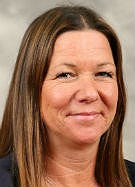TPx, Salesforce, More on Shaping the Workforce of the FutureTPx, Salesforce, More on Shaping the Workforce of the Future
The status quo is changing and, collectively, millennials are trying to shake away a fixed mindset.
October 11, 2018

CHANNEL PARTNERS EVOLUTION — The workforce of the future is going be different from what you know today. You might have already found that out when bringing in new hires. Face it, the status quo is changing and, collectively, millennials are trying to shake away a fixed mindset.
To learn more about what’s ahead for the workforce, a multigenerational panel participated in a session, “Channel NX2Z Workforce of the Future Symposium,” at Channel Partners Evolution in Philadelphia Wednesday night, to discuss what boomers need to understand about hiring recent grads or young adults, while younger channel pros got career advice from experienced professionals.
Panelists included: Tiffani Bova, global customer growth and innovation evangelist at Salesforce; Jason Bystrak, vice president, worldwide channels and distribution at eFolder/Axcient; Zane Conkle, CEO at Cytracom; and Hilary Gadda, director, national channel development at TPx Communications.

James Anderson
Taking a step back, moderator James Anderson, co-founder, Chanel NX2Z, and news editor at Channel Partners, set the stage — 75 percent of the channel will be made up of millennials by 2024 and today, for the first time, there are five generations working side by side.
“We’re talking about hiring and retaining talent, not replacing a generation but rather working together,” he said.
However, 2024 is around the corner. Bova, for one, is excited about that and seeing what happens when millennials take ownership of channel companies.
“I think that being digital natives brings with it a completely different perspective,” she said. “So, what kind of company will they build in the future, and what their expectations are and what they want to deliver from an experience standpoint or more importantly, how they want to engage with the broader ecosystem.
Gadda addressed a question about barriers to entry and getting young talent into the channel.
The most obvious barrier? Doing what we’ve been doing for the last 20 years and expecting to continue doing things from an established business perspective. Time to change.

TPx’s Hilary Gadda
“We really have to take time and effort to humanize what we do a bit more because that’s what’s important to millennials,” she said, adding that inclusivity is also key to making them feel like they’re part of the channel community.
Bystrak agreed and talked about rethinking management style, often done in silos. He suggested allowing millennials to figure out structure, which might be something other than functional silos.
“Let them bring technology to table, and we need to figure how to support them and not the other way around.”
Having a voice at the table is important to many millennials — as is looking for a culture of community.
Zane talked about the “4 L’s” – live, love, learn and leave a legacy.
“If those 4 L’s aren’t satisfied, especially for the millennial generation, they won’t be satisfied,” he said. “Millennials want to feel like they’re filling a bigger purpose.”
Fast forward … Anderson reached out to the panelists for advice for young professionals.
The first piece of advice — slow down. Putting that in the context of career development, Bystrak shared his experience with hiring: “Three months into the job, they haven’t hit their sales quota yet and they’re asking, ‘Where’s my promotion?'”
He suggested that …
… young workers live in the moment, gain experience and learn their role.
“So, as you move up the ladder, you’re able to handle problems that come with next level of maturity.”
Zane agreed that it’s important for young workers to gain experience and broaden their knowledge base. He suggests asking peers what they’re working on, even if it’s not related to your role — it could help you understand the organization at a broader level. To gain a better understanding of the channel, get out and talk to partners.
Other advice: When looking at a company to join, make sure that you’re doing it for the right reason and not for the logo.
“Make sure that they have what you want. That they have a training program, that they have a clear, concise road map for getting to the next level, and that they have hands-on training opportunities,” said Gadda.
Finally, Bova says to trust the process and become a student of whichever profession you choose.
Read more about:
AgentsAbout the Author
You May Also Like


